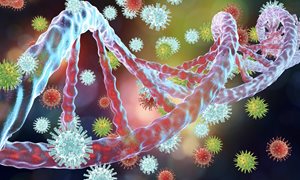
Inoculation with genetically-attenuated malaria parasites protects very well against malaria. This appears from research by Leiden UMC and Radboudumc published in The New England Journal of Medicine (NEJM).
Worldwide, nearly 250 million people contract malaria each year, especially young children in Africa. So there is an urgent need for a vaccine that provides a high level of protection. There are already two malaria vaccines, both based on a protein fragment of the malaria parasite. This piece of protein induces only limited protection against malaria: it prevents one-third to three-quarters of all malaria cases. Moreover, the effect declines sharply within one to three 3 years. The idea is, that broader and longer protection can occur when the immune system is trained not with just one protein fragment, but with a whole parasite, which is first genetically weakened.
Attenuated parasite
This is exactly what researchers from the Radboudumc and LUMC have done. Meta Roestenberg, professor of Vaccinology at LUMC: “We have removed an important gene in the malaria parasite, still allowing the parasite to infect people but not making them sick. These crippled parasites are administered through a mosquito bite and reach the human liver as usual. But because of the gene turned off, this parasite cannot complete its development in the liver, cannot enter the bloodstream, and thus cannot cause disease symptoms. Meanwhile, this crippled infection does create a strong immune response in the liver, which can protect the person from a real malaria infection in the future. At least that was the theory.”
Good protection
So the researchers tested the crippled parasite (GA2) in healthy volunteers. The results have now been published in NEJM. Matthew McCall, clinical microbiologist at Radboudumc: “Three times the volunteers were bitten by 50 mosquitoes with the crippled GA2 parasite to train their defenses. Then they were infected with a really pathogenic parasite. Eight of nine volunteers were found to have developed good protection and did not contract malaria. For comparison, eight volunteers were vaccinated with a previously developed crippled parasite: GA1. After exposure to this, only one of the eight volunteers had built up protection against malaria. In short, the test with our new crippled GA2 parasite performs very well. We now plan to test vaccination with similar GA2 parasites in real life.”
-
Paper in NEJM: Safety and Efficacy of Immunization with a Late-Liver-Stage Attenuated Malaria Parasite - Olivia A.C. Lamers, Blandine M.D. Franke-Fayard, Jan Pieter R. Koopman, Geert V.T. Roozen, Jacqueline J. Janse, Severine C. Chevalley-Maurel, Fiona J.A. Geurten, Helena M. de Bes-Roeleveld, Eva Iliopoulou, Emil Colstrup, Els Wessels, Geert-Jan van Gemert, Marga van de Vegte-Bolmer, Wouter Graumans, Thabitha R. Stoter, Benjamin G. Mordmüller, Emma L. Houlder, Teun Bousema, Rajagopal Murugan, Matthew B.B. McCall, Ph.D., Chris J. Janse, Meta Roestenberg.
-
Want to know more about these subjects? Click on the buttons below for more news.
Related news items

Nijmegen researchers find new genetic cause bubble boy disease SCID Genetic new born screening SCID can be further refined
19 March 2024Researchers from Nijmegen and Newcastle discovered a new genetic mutation leading to severe combined immune deficiency disorder (SCID). It’s the first time a mutation in the proteasome, a molecular shredder, has been linked to this serious disease.
go to page




